Menu
Menu
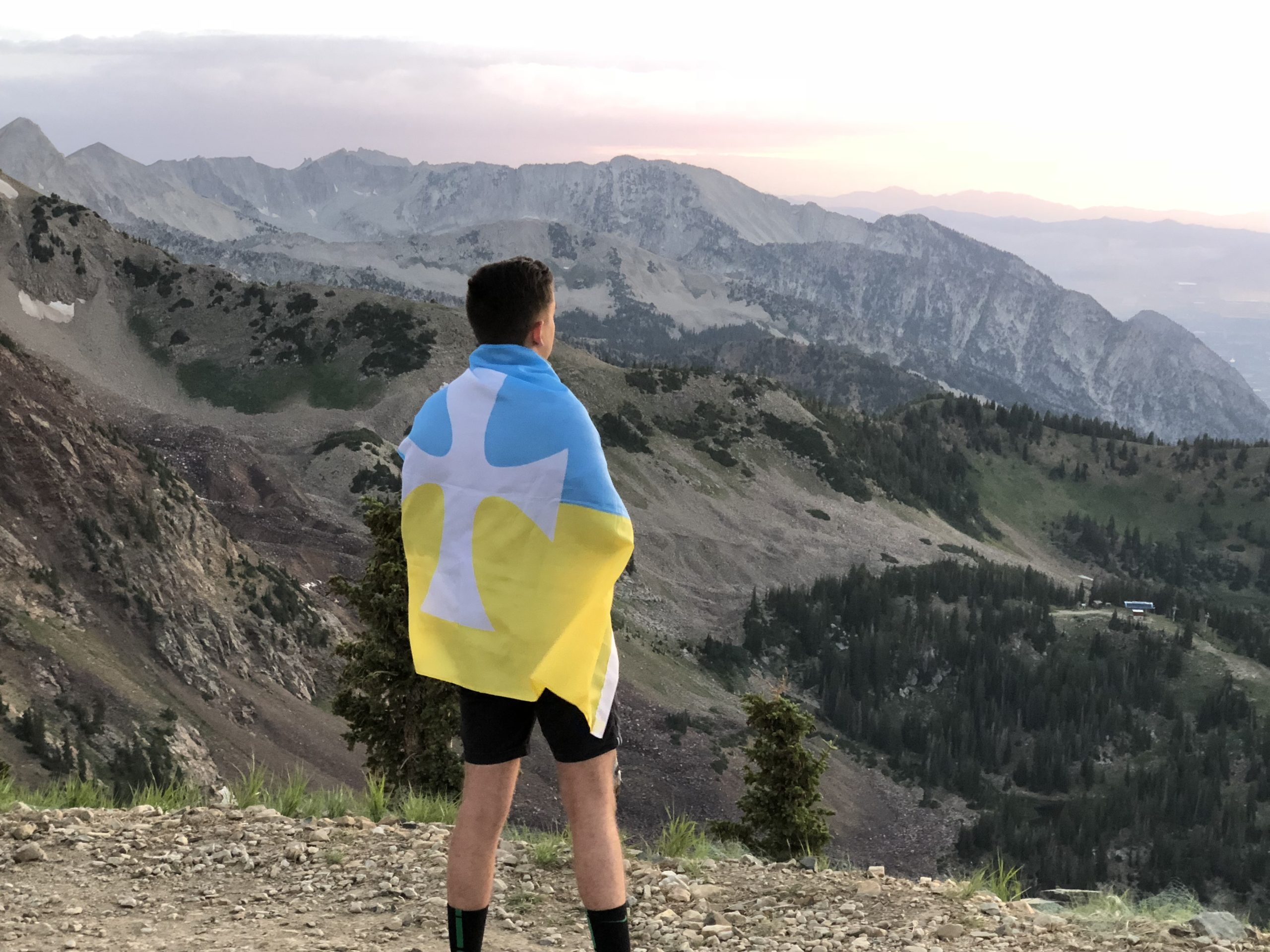
BY ASHLEY SZATALA
Co-founders and Kansas State Sigs Mark Potts, 2016, and Ryder Chaffee, 2018, discuss helping young professionals make the transition from school into the workforce and leadership approaches
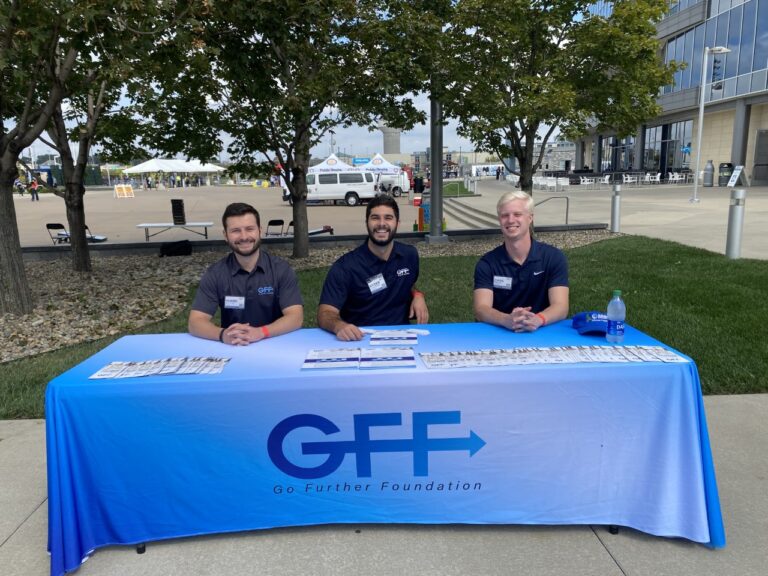
Transformational leadership is the practice by which leaders inspire and empower others to innovate and create change that will positively impact the Fraternity and ultimately the world. The transformational leader first must learn to manage self before being able to lead others and cultivate action within their community and campus.
Kansas State Sigs Mark Potts, 2016, and Ryder Chaffee, 2018, co-founded the Go Further Foundation in 2020 after they experienced similar situations in their first jobs out of college. After conversations with peers, they realized others faced comparable challenges in the transition from classroom to workforce that impacted mental health and overall well-being. The mission of the Go Further Foundation, based in the Kansas City, Missouri, area, is to create communities of young professionals committed to personal and professional growth and offer programs that take a positive, proactive approach to mental health. Potts and Chaffee discuss below the Go Further Foundation, the impact Sigma Chi has made on their lives and the launch of the foundation, and what transformational leadership and putting it into practice means to them.
TELL ME MORE ABOUT THE GO FURTHER FOUNDATION AND WHY YOU STARTED IT.
Mark: The Go Further Foundation started about a year ago. Our focus is helping young professionals transition either from high school into college or from college into the working world. And then also high school into the working world as well. That whole transition period can be tricky. There’s a lot of expectations in young professionals when it comes to that transition period that oftentimes don’t get met. And when those expectations don’t get met, that opens up the door to some adversity and some mental health challenges. So, we want to be able to take a proactive approach to mental health by offering support and structure to those young professionals as they transition into a new environment.
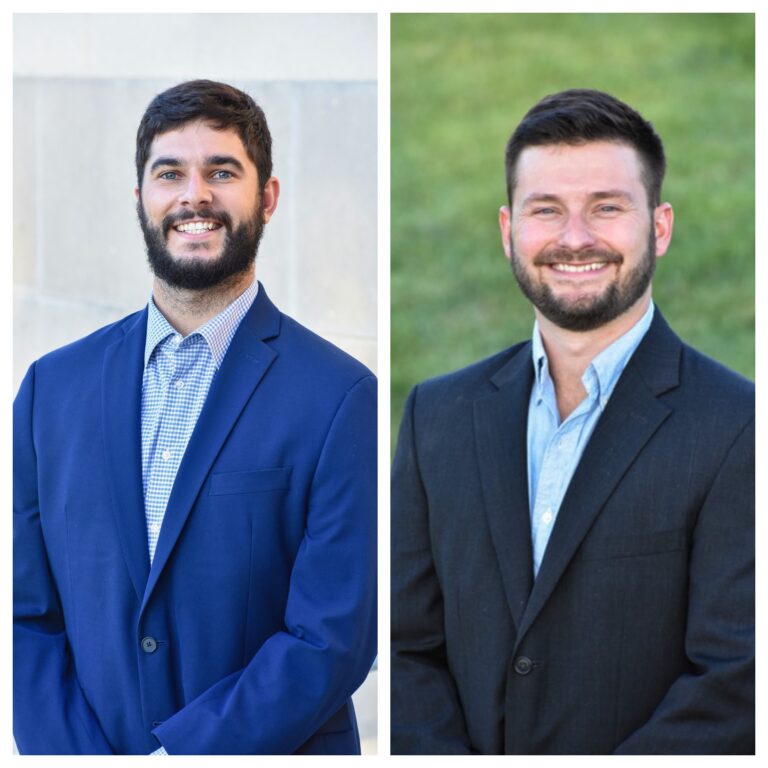
We call ourselves the Go Further community, so we like to get together as a group and do team-building activities to help build those relationships, so that could be something like a Top Golf, a Chicken N Pickle [restaurant with pickleball courts], or it could be a community service event. It’s all about making an impact in the community, making an impact on relationships and continuing to build that network. This is all driven by taking a proactive approach to mental health. We are partnered with a ton of mental health professionals to be that support that we need. We have a mental health 101 training and then we have a next level, mental health first aid, where you’re certified to assist someone who may be in crisis. We believe the more people we train, the more people can have tough conversations and be comfortable with that, which reduces the stigma [that can be associated with needing mental health assistance].
We went live with our first cohort in January, so we brought on 20 mentees and mentors, and then we had our second cohort in June. We just held our first fundraising event. It was a volleyball tournament called Bump, Set, Spike the Stigma. Go Further is growing kind of organically, and we’re really excited to be at a point where people are starting to know us. For example, the [Kansas City] Royals [baseball team] reached out to us to table at one of their events to give information on mental health. It was mental health day at the K[auffman Stadium]. [Professional soccer club] Sporting KC just asked us to do the same in October.
THE GO FURTHER FOUNDATION IS ABOUT BEING A SUPPORT SYSTEM FOR YOUNG PROFESSIONALS AS THEY LEAVE COLLEGE AND ENTER THE WORKFORCE. WHAT WAS YOUR EXPERIENCE LIKE AS YOU LEFT COLLEGE AND STARTED YOUR CAREER?
Mark: When I was graduating, I thought I had the whole world figured out. I started a job at Amazon. I was working six days a week, 12-hour days, refusing to say I need help, not wanting to show any weakness because I wanted to climb the ladder as quickly as possible. I started having those feelings of burnout but didn’t want to tell anybody. I wasn’t taking care of myself from an eating and sleeping standpoint. I didn’t know how to combat burnout, I didn’t know how to ask for help, and that’s when I started having my own dance with mental health. On top of that you have social media, which adds that extra noise of, “This is what my friends are doing, why am I not doing this? This was supposed to be my dream job, but I don’t feel that way.” It was so much pressure, and I ended up leaving Amazon.
"It’s all about making an impact in the community, making an impact on relationships and continuing to build that network. This is all driven by taking a proactive approach to mental health."
~Mark Potts, kansas state 2016
In conversations with my friends and others, they have a similar experience in that transition period of, “I have expectations; we’re told forever that we just have to get a job and we’ll be OK.” But nobody answers the question, “OK, I’ve got the job, what do I do for the next 45 years?” There’s an identity crisis that oftentimes comes along with that. I understood I needed to do something after my own experience, and then I had a similar experience with a friend of mine who had moved to New York. Circumstances were a little different. One thing led to another, he was in the wrong place at the wrong time, and he ended up losing his life in an accident having to do with a train. He was one of my pledge brothers. So, my experience at Amazon kind of let me know something needed to change, and then my experience with one of my best buddies is the fire in my belly. It’s that personal drive for me to keep pushing forward.
Ryder: I started with Seaboard Foods out of college and was in a small department at the time, just me and my boss. I would be in Kansas City for a week or two then do two weeks in Guymon, Oklahoma, most of the time making that drive by myself, which gives you plenty of time to think and also second guess a lot of things. The first six months I was back and forth between Kansas City and Guymon, spending plenty of time in a hotel within a city I wasn’t familiar with much. I don’t have an ag[ricultural] background, so I found myself wondering, “Am I in the right industry? Is my career path in line with where I want to go?” All of this is happening while I’m missing events being held in Kansas City.
Fortunately for me, the career choice I made was the right choice for me, as I am still with Seaboard Foods now almost four years later and enjoying each moment of it. My boss my first year was understanding and easy to talk to, which helped me keep a positive outlook on where I wanted to go [professionally], but that transition out of college was still tough. Like Mark said, you have this vision being out of college that life will be a little linear, and it just wasn’t that way. Oftentimes it can be difficult to say, “Hey, I’m just not really enjoying my time right now.” That first year was challenging, and not feeling comfortable addressing certain subjects didn’t help. That’s why we, as the Go Further Foundation, believe so much in our mission and our mentorship program to talk openly about these kind of things.
THE SLOGAN FOR THE GO FURTHER FOUNDATION IS, “IF YOU WANT TO GO FAST, GO ALONE. IF YOU WANT TO GO FAR, GO TOGETHER.” WHERE DID YOU FIRST HEAR THIS PHRASE, AND WHY DID YOU SELECT IT AS THE SLOGAN AND SUBSEQUENT NAME FOR THE FOUNDATION?
Mark: I can’t think of the origins. It’s been a favorite quote of mine for such a long time. It essentially speaks to everything that Go Further is, so it was a no brainer picking that. The tagline is going further together, and that’s kind of what we’re about. You’re stronger when you have people in your corner, and you’re more fulfilled when you have people in your corner.
Ryder: I think it’s kind of funny, though, because when Mark called me about this initial vision and this thought, it wasn’t the Go Further Foundation; it was the Strong Arms Foundation, strong arms coming from Sigma Chi with always having strong arms around you.
Mark: Great point. The folder on my computer that holds all of my Go Further stuff is called Strong Arms Foundation, so I haven’t even changed that.
IS THERE A PERSONAL EXPERIENCE WHERE YOU’VE ENCOUNTERED THE TRUTH OF THIS SAYING?
Mark: 100 percent. There’s obviously the passing of my buddy and leaning on my friends, specifically my girlfriend who’s been through thick and thin with me. And then in the Go Further Foundation seeing people build relationships with others who they otherwise would not have met. We were at our volleyball tournament, and I was talking to a young professional. She was moving jobs and wanting some advice, and she was reaching out to two of our mentors. She was like, “I’ve already got coffee set up with these two people.” That would not have existed otherwise.
Ryder: I’m not trying to tie this back to only Sigma Chi stuff, but when we kickstarted this off with that first cohort, we had to rely on friends first to jumpstart this and really get Go Further going. About half of cohort one was Sigma Chi connections. So, I just think it speaks to what the Fraternity has given us and how we’ve been able to utilize the Sigma Chi relations and that brotherhood to really push Go Further to where we’re at right now.
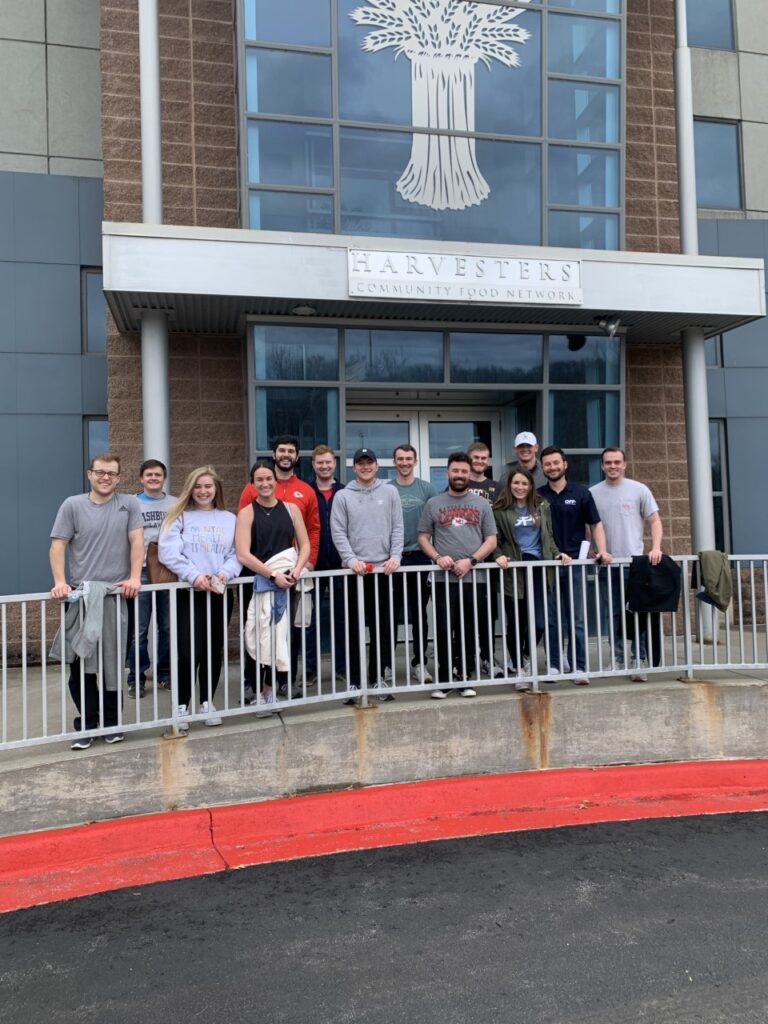
Mark: We’re broken into three co-founders, Ryder, me and then Blakelund Moroney, KANSAS STATE 2013, so the three who started it are all Sigma Chis. And, of course, we have mentors and young professionals who are Sigma Chis as well. We’re running deep on this organization from a Sigma Chi perspective.
Ryder: I think Sigma Chi is an experience that we haven’t taken for granted. The Go Further Foundation stands for community as a whole and not just the Sigma Chi network, but there are definitely similarities. If you look at the values on our website, we have seven values, similar to the seven values that Sigma Chi has.
WHAT’S NEXT FOR THE GO FURTHER FOUNDATION?
Mark: Our vision is to be able to have Go Further communities across the country. So, if there’s a situation where somebody is moving to a new area, they can reach out to the Go Further Foundation and have that network already available to them so they aren’t in a new area by themselves. We just kicked off committees, so that’s really our next step in growing the Go Further Foundation. These committees are allowing the operations within Go Further to be run by the people within it, which allows Ryder and I to do more of that business development, that operations management and then obviously raising funds to continue to grow our infrastructure.
Ruder: Committees is definitely a big thing for us. There are certain things we just don’t have that much experience in, one being social media. So that’s a committee we’re utilizing and have other people run social media. A business development thing we’re currently working on is getting out in the corporate world as well as universities to be able to bring in those first-year and second-year employees into the Go Further Foundation or even assist the people at K[ansas] State, KU [University of Kansas], UMKC [University of Missouri-Kansas City] and surrounding colleges to let them know Go Further is out there for them.
WHAT WAS YOUR UNDERGRADUATE EXPERIENCE WITH SIGMA CHI LIKE, AND HOW DID IT PREPARE YOU FOR STARTING THE GO FURTHER FOUNDATION AND WORKING WITH YOUNG ADULTS?
Mark: As a sophomore I was Magister and as junior I was Pro Consul, and the opportunity to lead my peers and work with others set me up for success jumping into a management position right out of school. You also have the leadership benefits and building those competencies to prepare you for the real world because a lot of what is going on within the different leadership positions in the [chapter] house is exactly what you’re going to expect in a corporate environment as well.
Ryder: I was Magister for a semester my sophomore year and then Pro Consul the second semester, and then junior I did Consul. After graduation I was Grand Praetor. Oftentimes I say my Sigma Chi leadership experience set me up better for the real world than my actual college education experience. At the time we didn’t have huge alumni involvement, so it was really undergrads running all the operations and making decisions. Those decisions are then going to affect 60-plus people. Now there’s a different story because we have alumni involvement.
Mark: We didn’t have alumni support, and there’s a reason for that: It was the culture within the house. On top of the leadership positions, we had to be the main proponents amongst others to change the culture in the house to get to a level to get involvement from alumni.
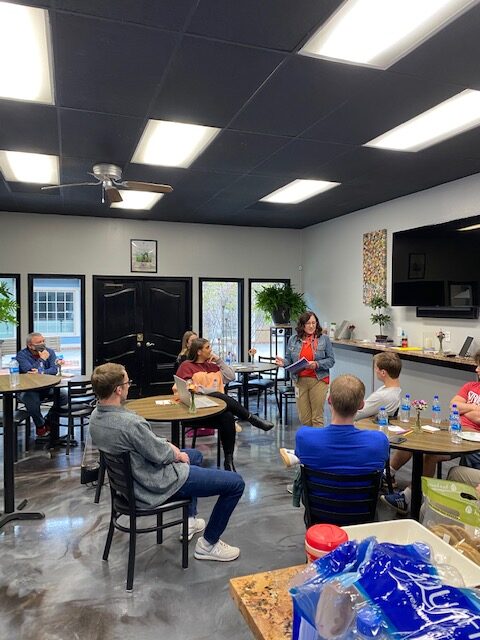
WHO DO YOU LOOK UP TO FOR INSPIRATION OR MENTORSHIP?
Mark: I’m very close with my dad. He works for an engineering company, and he and I have always been very close. So being able to talk at the dinner table about his teams, how he’s approaching different situations and problem solving, and just his approach to leadership and relationships has always been something I’ve looked up to.
Ryder: For me it’s definitely my mom. She does such a great job at seeing the overall picture and being able to listen and then make decisions instead of just making decisions right off the bat without the full story. She’s been someone I’ve leaned on for the past three years if not more through my work experience.
WHAT ARE IMPORTANT ATTRIBUTES OF A SUCCESSFUL LEADER?
Mark: I think [entrepreneur] Gary Vaynerchuk says it best. He always mentions how when you’re in a leadership position you really work for the people below you, and it’s all about making sure you meet them where they’re at because everyone has different priorities, and everyone learns differently. If you can have the emotional intelligence to recognize that, it makes you way more effective as a leader. It’s also all about listening and making sure you’re creating an environment where people can give feedback and receive feedback and it’s based in a constructive way. I think that’s the best way to approach leadership, and the way to continue growing as a leader is to never stop learning. It doesn’t stop when you’re out of school.
Ryder: I’m huge into leadership strategy, so I’ve kind of constructed my own thoughts on leadership. I approach it with three different things. It’s to lead, to advise and to inspire. To lead is to lead with work ethic, and one thing with being a leader is to also know when you’re not the best fit in the group. So even though you might be the team captain, you still might have to take a backseat to someone else who might have more experience in that field. Next is to advise based on knowledge. Like Mark mentioned, that comes with continuous learning. And then it’s to inspire based on passion. You don’t necessarily have to have a passion for that No. 1 goal but a passion for the community around you, which will just help push your team forward.
WHAT ADVICE DO YOU HAVE FOR WAYS PEOPLE CAN INSPIRE AND EMPOWER OTHERS TO CREATE CHANGE AROUND THEM?
Mark: For me it’s leading by example. If you can show people you’re passionate about a topic and you’re willing to stand for it, it disarms others from their own concerns that the thing they wanted to stand for is not worth it. A lot of people have that in their heart to want to make a change. Sometimes it takes somebody else to step up and lead and say enough is enough, and that then ignites others.
Ryder: Something that Go Further promotes is being true to yourself and being true to others. If that means being vulnerable to people you’re not normally vulnerable with, go ahead and be that way. We want to make vulnerability a strength and not a weakness. Sometimes being able to open up shows the passion and the emotions and can then encourage someone else to take that first step into the change they want to make in the community around them.
Mark: I think with Go Further we really wanted to be that beacon of change and that beacon that vulnerability is a strength. And the more we continue to raise awareness about what we’re trying to accomplish, the more people feel better and more included. It breaks down the walls of having to do everything by yourself because you think nobody understands. The more you can get the message out there that there are folks who understand and that we can go further together, I think the better our society would be.
WHAT DOES TRANSFORMATIONAL LEADERSHIP AND PUTTING IT INTO PRACTICE MEAN TO YOU?
Mark: To me it’s changing the status quo. Being transformational is looking at it from a different lens, taking the things that have always been and shaking them up and seeing if you can do it better differently. And that’s really the approach the Go Further Foundation takes. We do the personal and professional development because what we say is you can’t have total health without mental health. With personal and professional development and feeling like you’re in a good place, there is a direct correlation to your mental health and a direct correlation to total health, and that’s the difference that we’re trying to transform.
Ryder: Something we always want to do is to inspire and to motivate, and if we can do that with the resources that the Go Further Foundation offers, then we can check that off as a win. We want to be able to inspire and motivate you in your personal life, your professional life and anything along those lines.
For more information about the Go Further Foundation, visit its website here.
Transformational leadership is the practice by which leaders inspire and empower others to innovate and create change that will positively impact the Fraternity and ultimately the world. The transformational leader first must learn to manage self before being able to lead others and cultivate action within their community and campus. This quarterly series highlights members who are putting transformational leadership into practice. For more information about Sigma Chi's Transformational Leader program, visit sigmachi.org/transformational-leader.
